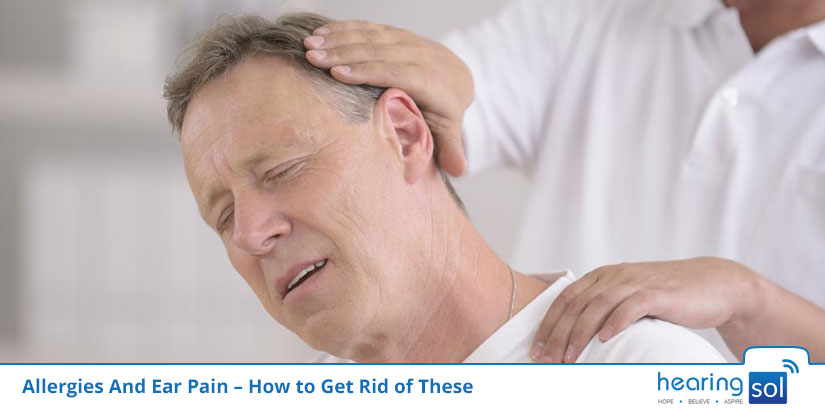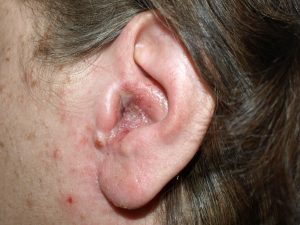
Allergy is basically a hypersensitivity reaction towards something. It could be anything from a particular food item to pets, which is common with a lot of people. Learn here how to prevent Allergies And Ear Pain?
So, when people often think of allergy problems, what usually comes to their mind are symptoms of a sneeze, runny nose, and itchy eyes.
You can purchase the latest hearing aids at a fair price through HearingSol, If you need any assistance or you have a query regarding Allergies, Ear Pain, and Hearing Loss, feel free to call us at +91-9327901950. We are always here to help you.
However, most people do not realize that our ears can as well, be affected by allergies.
Allergy in Ears
Allergies mostly affect a person’s middle ear. The middle ear has a drainage tube like that of a pressure release valve, which is called the Eustachian tube.
If this tube is clogged with mucus, or if its opening gets blocked by allergy swelling, then pressure and fluid can build up in the middle ear. This gives the person the sensation of feeling down, having the need to pop one’s ears frequently, and can also result in diminishing one’s hearing ability.

The fluid build-up also creates a protective environment, especially against dust and infection, which may likely occur. Middle ear infection, also called ‘otitis media’, commonly occur in children and is usually treated with antibiotics that are prescribed by a doctor.
Infection in the external ear, also called ‘otitis externa’ or swimmer’s ear, is usually caused by a bacteria found in water called pseudomonas, although it may not be directly related to allergies.
Allergies are a well-recognized cause for recurrent otitis media condition. Disorders affecting the inner ear, such as tinnitus and Meniere’s disease, may have an allergic component as well. It can also lead you to ear pain.
The Pain In The Ear
Most people, whether young or old, suffer from ear pain which may be linked to one or more allergic reactions. There are many causes of allergies and ear pain and how each of the allergic reactions leads to ear pain is incredibly different.
Allergies that cause ear pain often affect the middle ear, where the pressure release valve called the Eustachian tube is located. Thus, if this part of the ear swells due to an allergy, then fluid, sometimes with pressure, can build up and give you a feeling to pop your ears open.
It may also cause reduced hearing. The fluid that builds-up due to allergies may also cause infections in the middle ear.
Some of the common allergies that affect the middle ear include:
- Allergies which are associated with sinusitis and asthma. Usually, blocked sinuses lead to the development of pressure in the middle ear, which then leads to pain in the ear.
- Allergies due to exposure to cigarette smoking often make the inner ear inflamed and causes pain in the ear.
- Allergies caused by bottle-feeding and the use of pacifiers because these may carry bacteria that can easily find its way to the middle ear thus, causing swelling.
If left untreated, allergies can increase your susceptibility towards a wide range of other infections, such as:
- Hearing loss
- Speech delay
- Injuries to the ears
- Dizziness
- Facial paralysis
- Inflammation of the ears
- Sleep disorder
- Discomfort
Treatment of Allergy And Ear Pain
If a person has allergies accompanied by ear pain, then proper treatment is advised by a professional health practitioner. Allergies can also be best prevented by simply avoiding the things which you are often allergic to.
There are two ways to treat ear pain caused by allergies which are treated through medications and home remedies if the problem is mild.
Medications For Allergy And Ear Pain
Some prescription and over-the-counter medication can help in reducing allergy symptoms or allergic reactions. Some of them are:
- Cetirizine
- Chlorpheniramine
- Diphenhydramine
- Fexofenadine
- Levocetirizine
- Loratadine
There are also some decongestants available to reduce the feeling of fullness in your ears which are:
- Cetirizine plus pseudoephedrine
- Fexofenadine plus pseudoephedrine
- Loratadine plus pseudoephedrine
To treat a stuffy or runny nose or sneezing, some available corticosteroid nasal sprays are:
- Budesonide
- Fluticasone Furoate
- Fluticasone propionate
- Mometasone
- Triamcinolone
If you are allergic to something like dust or pollen, your doctor may recommend medications in order to treat the symptoms. One of the most common treatments of ear pain is the administration of a daily anti-histamine.
Newer antihistamines, which are not likely to cause drowsiness, are often prescribed by doctors. Sometimes, nasal sprays are also prescribed to help reduce congestion.
These are some medication available for allergies and it’s related symptoms, now take a look at some home remedies to prevent allergies or ear pain:
Allergy And Ear Pain Home Remedies
Following are the steps you can try at home to reduce or manage discomfort in your ear:
- Rest in an upright position like opposed to lying down, to reduce pressure in the middle ear.
- Put a cold pack on your outer ear for about 20 minutes to reduce pain
- Chew chewing gum to ease pressure and pain
- Take over-the-counter medications like Acetaminophen, Ibuprofen, etc, to ease or reduce pain
Herbal Remedies
If your ear pain or earache is caused by seasonal allergies, then to get an effective result the underlying problem should be treated. And in this case, if you are looking for a herbal remedy to solve the related problem then Plantago is an effective herbal remedy for you.
It helps in reducing inflammation of membranes in the upper respiratory tract and it also contains naturally occurring antibiotics. It is the major reason that it is found effective to treat ear problems.
Conclusion
Seasonal allergy can make some time of the year difficult for people who experience its symptoms. Most of the time, when you experience any decrease in hearing due to allergy, it is typically temporary and your hearing will normally return after your symptoms or infection clears.
However, if you still suffering from an ear infection, it may also be necessary to complete a course of antibiotics in order to kill bacteria that may be present in the ear. It is, therefore, important to take antibiotics as prescribed by your doctor in order to prevent antibiotic resistance.
In case you are receiving treatment already for allergies but are still suffering from frequent infections and pain in the ear, your doctor may recommend a surgical placement of the ventilation tubes in order to help your auditory tube to stay open.
You can purchase the latest hearing aids at a fair price through HearingSol, If you need any assistance or you have a query regarding Allergies, Ear Pain, and Hearing Loss, feel free to call us at +91-9327901950. We are always here to help you.

 Reviewed by Mr. Ranjeet Kumar
Sr. Audiologist, Speech Therapist & Cochlear Implant Specialist, BASLP on
Reviewed by Mr. Ranjeet Kumar
Sr. Audiologist, Speech Therapist & Cochlear Implant Specialist, BASLP on